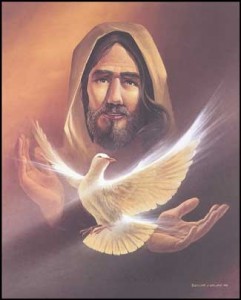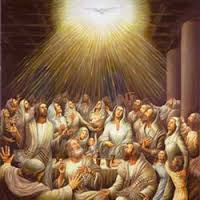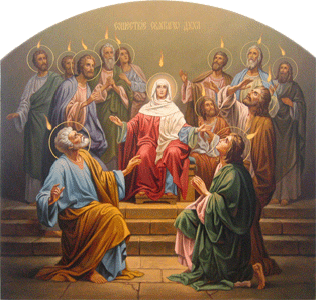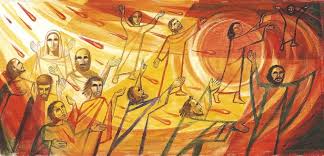
- 19-05-2024 -
Gospel Text: John 15:26-27; 16:12-15
Ch 15 v. 26 Jesus said to his disciples:
‘When the Advocate comes,
whom I shall send to you from the Father, he will be my witness.
he will be my witness.
Ch 15 v. 27 And you too will be witnesses, because you have been with me from the outset.
Ch 16:12 I still have many things to say to you but they would be too much for you now.
Ch 16:13 But when the Spirit of truth comes, he will lead you to the complete truth, since he will not be speaking as from himself
but will say only what he has learnt;
and he will tell you of the things to come.
Ch 16:14 He will glorify me, since all he tells you
will be taken from what is mine.
Ch 16:15 Everything the Father has is mine.'
******************************************
We have four commentators available from whom you may wish to choose . Scroll down to the name of the commentator required.
****************************************
Michel DeVerteuil
Lectio Divina with the Sunday Gospels
www.columba.ie
General Comments
 Knowing the background to the liturgical celebration of Pentecost is important to help us understand the feast correctly. People often say to me that they are unhappy with the way Pentecost is celebrated in the liturgy; they find it comes and goes too quickly. Easter gets plenty of importance, having its own six weeks of Lenten preparation,“an octave”, so that the celebration continues for eight days; Ascension is celebrated until Pentecost, but Pentecost itself is over in one day, and then we are back in Ordinary Time. Churches are beautifully decorated in red – but only for one day.
Knowing the background to the liturgical celebration of Pentecost is important to help us understand the feast correctly. People often say to me that they are unhappy with the way Pentecost is celebrated in the liturgy; they find it comes and goes too quickly. Easter gets plenty of importance, having its own six weeks of Lenten preparation,“an octave”, so that the celebration continues for eight days; Ascension is celebrated until Pentecost, but Pentecost itself is over in one day, and then we are back in Ordinary Time. Churches are beautifully decorated in red – but only for one day.
There is a simple reason why Pentecost lasts one day only: in the Church’s liturgy, Easter is one fifty day celebration, and Pentecost marks its close. This was one of the changes brought about by the liturgical reforms of the Second Vatican Council (1962-1965). Before that, Pentecost – known as Whit Sunday – was celebrated as a major feast, with its own vigil and octave.
Restoring the importance of the liturgical seasons was one of the major conciliar reforms. The Decree on the Liturgy states (107 and 108):“the liturgical year is to be revised so that the traditional customs and discipline of the sacred seasons shall be preserved and restored.” It added, “Their specific character is to be retained so that they duly nourish the piety of the faithful as they celebrate the mysteries of the Christian redemption,” and again, “The minds of the faithful should be directed primarily towards the feasts of the Lord whereby the mysteries of salvation are celebrated throughout the years” so that “ the entire cycle of the mysteries of salvation may be suitably recalled.”
The seasons remind us that being followers of Jesus means more than obeying his commands; it means being in union with him, in the words of Trinidad's Fr Clyde Harvey’s wonderful hymn, “being the body of the Lord, is having his spirit coursing through our souls.”
Each season celebrates a particular moment in the life of Jesus; we refer to these as “mysteries” because he continues to live them in us today. We don’t merely “remember” the seasons, we “celebrate” them, recognising similar stages in our own lives. As the Vatican Council stated, “They are in some way present at all times; the faithful lay hold of them and are filled with saving grace.”
There are five seasons, and they are arranged chronologically to correspond to the stages of Jesus’ life:
1- during advent he is in Mary’s womb;
2- at Christmas he is a baby and then a little child;
3- during Lent he is a powerful adult, preaching repentance and new life;
4- in the Sacred Triduum he is powerless, passing through death to resurrection.
5- Easter the fifth and final season; it celebrated the last stage in Jesus’ life when he did three things:
- he rose from the dead,
- ascended into heaven,
- sent the Holy Spirit on his followers.
These are three different historical events but also three aspects of the one “mystery” of Jesus’ triumph over death.
- The resurrection reminds us that his tomb was empty, death had no power over him.
- The ascension that he was no longer limited to one place and time but was at the right hand of the Father and at the same time “with” his followers as they went out into the whole world “making disciples of all nations”.
- The sending of the Spirit that he was now really present within them – the “short time” had passed and they could “see him” again (cf. John 16:17).
The sequence of the different aspects of the Easter event varies in the New Testament accounts. St Luke’s gospel (which we read on the feast of the Ascension in Year 2) tells us that Jesus ascended on Easter Sunday, and in the gospel readings for the feast of Pentecost St John relates that Jesus Breathed the Spirit on the disciples on “the evening of the same day” – Easter Sunday. It is also significant that, according to the lectionary, we read the story of the coming of the Holy Spirit in the first reading of Easter Monday, and that of Jesus’ promise to send the Spirit on the Sundays and weekdays of the fifth and sixth weeks of Easter time.
 The liturgy, then, far from downplaying the sending of the Holy Spirit, highlights it. But it also gives us some important pointers on how we are to understand this event. I will just mention three.
The liturgy, then, far from downplaying the sending of the Holy Spirit, highlights it. But it also gives us some important pointers on how we are to understand this event. I will just mention three.
1. People sometimes refer to Pentecost as “the feast of the Holy Spirit”, but that is not a good expression. It is a feast of Jesus, the “mystery” of his sending the Holy Spirit on his followers, the moment when he became present to them in a new way – by being with them.
2. We too come to a stage in our lives as parents, teachers, church ministers and spiritual guides, when we have to let go of those God has entrusted to our care and let them live their own lives. Like Jesus, we must “breathe on them”, so that they may be guided inwardly by the values we taught them. Like Jesus too we can do that only if we have first given our lives for them – which will include being crucified.
3. The coming of the Holy Spirit is an event in our lives as it was for Jesus’ disciples. It is the moment when we realize that following Jesus is not a matter of keeping commandments but of having him live within us. The experience is always the culmination of a journey – we first have to look wonderingly at an empty tomb; to see the risen Jesus and then to have him vanish from our sight; to wait a long time in Jerusalem, trusting that the Lord’s promise will be fulfilled.
Scripture Reflection Prayer
“Walk the dark ways of faith and you will attain the vision of God.” ....St Augustine
Lord, we thank you for this Easter season which we have now completed.
We thank you for the times when we have to stand hopefully
before an empty tomb,
times when we see you and live with you
and then have you vanish from our sight
and have to wait for you in Jerusalem for what seems an interminable time,
until eventually your promised Spirit comes on us and we can live again.
 “The literal meaning of Scripture is the field, while the deeper and more profound spiritual reading is the treasure hidden in the field.” ...Origen
“The literal meaning of Scripture is the field, while the deeper and more profound spiritual reading is the treasure hidden in the field.” ...Origen
Lord, we thank you for the times when we have remained hidden from others.
We too were afraid that the terrible deeds that were done to Jesus might be done to us.
Then you walked through our closed doors and,
with no advance warning, you came to stand among us.
You did not condemn us. You merely assured us that we can live in peace.
You made us feel secure – within ourselves, with one another, and with you, our only God.
Lord, we thank you for the times when we felt we were really thirsting to go to others as you sent us to them.
We too can tell others the good news that they can rise from the dead and find new life in you.
Lord, we thank you for the times that we can say to one another what Jesus said to his disciples. We too have felt within us that feeling of being close to God.
We would like to share this feeling with all those you have given to us. Help us by word and gesture to make this a reality.
“Understanding can follow where experience leads.” ...St Bernard
Lord, we thank you that just as you have felt his inner spirit within you,
You eventually became able to breathe on us.
We could then feel your presence within us.
We knew then that you were at work among us.
“The gravest sin committed against our country is to have classified the struggle of the Guatemalan people as the work of communists.” ... Rigoberta Menchu
Lord, remind us that we who have been blessed
By the sending of the Holy Spirit do not belong to the world.
We therefore have the ability to forgive the real sins of your people,
but we can also retain those which need to be retained and not forgiven.
*************************************
Thomas O'Loughlin
Liturgical Resources for the Year of Matthew
www.columba.ie
Introduction to the Celebration
Today we are celebrating a feast that was celebrated by many of the Jews who lived at the time of Jesus. Many of his early followers continued to celebrate it after the resurrection, and so it became part of the annual celebrations of all Christians. However, over the first few decades of the church, this feast took on a new meaning: Jesus has risen and ascended to the Father, but he promised us his Spirit.
 So today we rejoice that the Spirit is moving in each of our hearts making us a people, inspiring us to understand the mystery of our faith, and strengthening us to follow Jesus the Anointed One.
So today we rejoice that the Spirit is moving in each of our hearts making us a people, inspiring us to understand the mystery of our faith, and strengthening us to follow Jesus the Anointed One.
Gospel Notes
1. The focus of Pentecost for Christians is as a celebration of, and a thanksgiving for, the presence and focus of the Spirit in our lives as Christians. The Spirit is the one who brings unity
— unity with one another and with Christ, and so the church is ‘his’ work. Today is a thanksgiving for this gift, membership of the church, which we profess in the recitation of the Creed: ‘we believe in one holy catholic and apostolic church’. Significantly, it is this gift of belonging to the People that made Christianity so attractive in the early centuries of its life where the emphasis was not on a set of peculiar doctrines which were shared by a group (e.g. the eastern mystery cults), but on belonging to a new community which had doctrines peculiar to it. We see this concern with belonging to the church in one of the simplest creeds that has survived from that time: ‘I believe in God, the almighty Father and in his only-begotten Son, Jesus Christ, and in the Holy Spirit and in the resurrection of the flesh in the holy catholic church.’ Belonging to this universal (i.e. catholic) group that cut across social, ethnic, linguistic, and political boundaries, was central to their self-understanding and was the on-going work of the Spirit.
2. If Luke wants us to use a festival fifty days after our Passover to recall the fundamental belief that the presence of God, the Spirit, dwells within and activates the church, how does he imagine that presence? It is with this question we should look at his carefully crafted story in Acts 2.
The Spirit is the one who gathers us — all the different
‘nations’ are brought into contact with one another. Then the
Spirit unites them into one church gathered around Jesus — so the followers of Jesus everywhere are linked through the apostles. The Spirit then inspires them and sends them forth to be the witnesses to Jesus to the ends of the earth.
As Luke writes he has in mind the many individual churches where
his work will be read and wants to ensure that each individual church recognises itself as a node in a great web that stretches not only across the empire (the oikumene) — ‘visitors from Rome’ — but even beyond its borders (Parthians and Medes) and so is universal.
3. We tend to think of ‘the church’ firstly as the worldwide institution and then of the local church as only ‘the local office’.
Hence we have tremendous concern with making sure that everything is the same universally — just look at the old arguments for a single liturgy in Latin or the present arguments over translations. This attitude blinds us to much of Luke’s ecclesiology. He did not see unity as a unitary glut: but rather that the gospel could adapt itself to each nation — hence they did not hear the message in the lingua franca (in which he himself wrote) but in their own tongues.
Unity between the churches is a gift of the Spirit, not a function of uniformity of
practice. This reflected the real situation in which Luke wrote, where Christianity was already present (and this is pointed out in Acts) in, at least, four major linguistic areas: Greek(Asia and eastern Europe) and so Latin, Syriac (the spread of Christianity eastwards from Palestine), and the vernaculars
of Egypt! the Nile valley. He assumed that they would each be different but would be bonded together not only by common rituals and books, but by a vision of themselves that was larger than their own Eucharistic group, region, nation, or any political boundary. While they would live and act locally,
they would think globally, and so testify that the new covenant meant Christ through them was offering his risen life to every human.
***********************************
Sean Goan
Let the reader understand
www.columba.ie
Gospel
The fourth gospel speaks of the Holy Spirit as the Paraclete or Advocate. The word is taken from legal language and may refer to a lawyer for the defence, but it also means a guide and today's text, taken from two different chapters of John, speaks to us about both aspects. The work of the Holy Spirit is to makes us confident witnesses as we show the world that there is more to life that mere survival or the pursuit of pleasure. The Spirit of truth allows us to witness in every era to the timeless message of God's love – a truth revealed in the life, death and resurrection of Jesus. However, such is the depth of the mystery of the Word made flesh that no single generation can grasp it entirely and so we are guided by the Spirit in coming to a greater understanding of what is revealed.
Reflection
Birthdays deserve to be celebrated. They are occasions when we can be thankful for the gift of life, and for the love we have received. They provide the opportunity for families to get together and recall good memories from the past and also a chance to look to the future, aware of how far we have come. So it is with Pentecost.
Today is the birthday of the church, a time for us to celebrate who we are and to rediscover what it means to be the people of God. Down through the centuries the Holy Spirit has guided the church, despite the weaknesses of its members, both clerical and lay. We have the witness of many generous and heroic people who have been 'led by the Spirit' and whose lives have given eloquent testimony to the power of God at work in them. Today, then, let's take heart and invoke the Spirit of God that we may be filled with a joyful appreciation of who we are and what we have to give. This brings with it many challenges, since for many religious people their faith acts as a sort of security blanket, offering certainty and security.
to rediscover what it means to be the people of God. Down through the centuries the Holy Spirit has guided the church, despite the weaknesses of its members, both clerical and lay. We have the witness of many generous and heroic people who have been 'led by the Spirit' and whose lives have given eloquent testimony to the power of God at work in them. Today, then, let's take heart and invoke the Spirit of God that we may be filled with a joyful appreciation of who we are and what we have to give. This brings with it many challenges, since for many religious people their faith acts as a sort of security blanket, offering certainty and security.
However, the good news is not about how things were in the past but about the Spirit of God at work now and always.
Happy Birthday Church!
**********************************************
Donal Neary SJ
Gospel Reflections
www.messenger.ie/bookshop
Spirit of Unity
The effect of the Holy Spirit at the first Pentecost was to create unity – the incident of people understanding different languages should not be taken literally, but that some deep divisions among people can be overcome by the Spirit of God. Many of the gifts of the Spirit in the second reading are about a deep unity among us – trust, love, patience. These and other gifts of the Spirit bring unity at a deep level in families, friendships, all kinds of relationships and communities.
The effects of disunity can lead in the end to murders, violence and wars. No wonder Jesus prayed so often for unity, and his Spirit would unite us.
Disagreements may happen in the best of relationships, and lead often to peace in the end. Dividedness never leads to peace and is never from God.
Another unity of Pentecost was the reconciliation between Jesus’ natural family and the new family of the apostles. Another gospel account says that in the upper room were people like James, his family ‘brother’, and Mary his mother, who was the uniting love of all Jesus’ followers.
On the inbreath, breathe in the Spirit of God,
the wind that blows where it wills.
Come Holy Spirit;
Fill our hearts.
Bring your peace and unity to our world.
May your kingdom come and your will be done.
Amen.